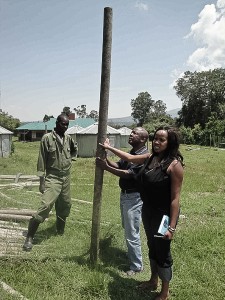 The 2011 Cartier Women’s Initiative Finalist have been announced. The aim of The Cartier Women’s
The 2011 Cartier Women’s Initiative Finalist have been announced. The aim of The Cartier Women’s  Initiative Awards is to support meaningful business projects that combine innovation and audacity. Started in 2006 in partnership with the Woman’s Forum, the INSTEAD business school and Mckinsey, the Cartier Women’s Initiative Awards are an international business plan competition for female entrepreneurs who lead creative, financially sustainable and socially responsible companies. The finalist are selected from around the globe. One of this year’s finalists is Kenyan EcoPost founder Lorna Rutto. EcoPost is a Kenyan firm that uses 100 % recycled plastics to manufacture aesthetic, durable and environmentally friendly fencing posts and custom lumber profiles. Plastic waste is a frequent blot on Kenya’s beautiful landscapes. In spite of a government ban on the use of plastic bags, which came into force in 2007 when Kenya was producing 48 million of them, plastic of all kinds and shapes litters the land or piles up in open tips.
Initiative Awards is to support meaningful business projects that combine innovation and audacity. Started in 2006 in partnership with the Woman’s Forum, the INSTEAD business school and Mckinsey, the Cartier Women’s Initiative Awards are an international business plan competition for female entrepreneurs who lead creative, financially sustainable and socially responsible companies. The finalist are selected from around the globe. One of this year’s finalists is Kenyan EcoPost founder Lorna Rutto. EcoPost is a Kenyan firm that uses 100 % recycled plastics to manufacture aesthetic, durable and environmentally friendly fencing posts and custom lumber profiles. Plastic waste is a frequent blot on Kenya’s beautiful landscapes. In spite of a government ban on the use of plastic bags, which came into force in 2007 when Kenya was producing 48 million of them, plastic of all kinds and shapes litters the land or piles up in open tips.
Lorna has been troubled by this plastic litter ever since she was a schoolgirl. At the time she used to collect bits left lying around and turn them into earrings, ‘though it wasn’t really the earrings I was interested in—I just wanted to find a way to get rid of all that plastic!’ After graduating in commerce and accounting five years ago, she started a career in banking to play safe in a tough employment market, but ‘something felt wrong; I was working on systems and structures and not with people and science, which had been my other passion at school. I wasn’t comfortable about it.’ Two years ago, she took the entrepreneurial plunge. Her love of the environment found an echo with a young biochemical engineer she met at her first job, now her business partner, who brings his technical expertise to her financial and managerial know-how. After researching potential avenues for their cause they found that plastic was the best place to start, much to Lorna’s delight!
Kenya has barely 2% of forest cover, yet high demand for posts to make fencing around the country’s houses, plantations and huge game reserves. For years these were made from red cedar trees, which are now an endangered species; a presidential directive has made it illegal to chop them down since 2007. Those looking for an alternative can bank on EcoPost, which recycles waste and helps the environment. Utilising dirty plastic to make a product that saves wood is not just an environmental plus, it boosts employment: alongside its 15 permanent staff, to source its raw material EcoPost hires the services of hundreds of women working as casual labor to collect the plastic and sell it to them by the kilo. In its first eight month of operations, EcoPost manufactured 5,000 posts, removing 300 tonnes of plastic waste from the environment. ‘That’s 500 trees that won’t be chopped down,’ Lorna states. And who knows, some might even end up fencing the forests they have helped to save.


